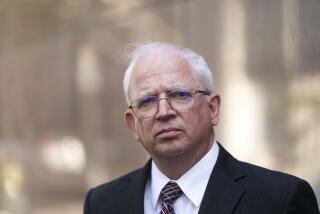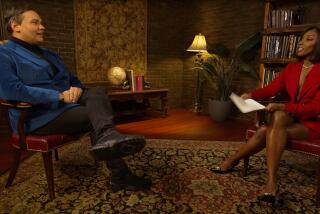Limelight dims for ex-congressman Tom DeLay
- Share via
Reporting from Austin, Texas — Not long ago, Tom DeLay commanded the spotlight of the Republican Party and the support of legions of Texas conservatives with his legendary enforcement of political loyalty. But today, as the former U.S. House majority leader spends a third week on trial for money laundering and conspiracy, some wonder how many are still paying attention.
“For a while, DeLay really occupied the popular imagination here,” said James Henson, director of the Texas Politics Project at the University of Texas at Austin. “A lot of the average folks really have no idea who he is anymore.”
On Monday, in a third-floor Austin courtroom where cacti line the windowsill, just a smattering of spectators looked on as a relaxed and smiling DeLay offered a “mornin’ y’all” to prosecutors before panning the room for familiar faces.
Later, in a brief interview, the former Houston-area congressman insisted that he remained politically relevant and continued to get support from all over the country.
“I can’t go anywhere where somebody doesn’t recognize me,” he said, attributing that recognition to both politics and his appearance last year on the television show “Dancing with the Stars.”
But Henson and other observers say DeLay’s trial has captured the interest of journalists and political insiders far more than the general public.
Prosecutors said DeLay helped direct a scheme to funnel $190,000 in corporate donations to seven individual state campaigns in 2002, a violation of Texas law. That money helped the GOP gain control of the Texas House, a power Republicans used to redraw congressional boundaries following a plan DeLay helped engineer.
DeLay, whose take-no-prisoners style earned him the nickname “The Hammer,” maintains that the activities represented politics as usual and that he did nothing illegal. He said Monday that prosecutors had yet to prove any wrongdoing. Prosecutors ended their case Wednesday.
Ironically, the trial began a day before Republicans swept to their historic midterm victory Nov. 2, the same kind of political wave that DeLay rode to the spotlight in 1994 before being elected majority leader in 2002.
He was indicted in 2005, resigning his seat the next year and keeping a low public profile while awaiting trial, with the notable exception of his attempting the cha-cha-cha to “Wild Thing” on national television.
Steve Munisteri, chairman of the Republican Party of Texas, said the five-year wait for trial forced DeLay into a political no-man’s land, offering an example of the transient nature of power and fame.
“I think it hurt him tremendously. I think that anybody who would be interested in employing him is going to wait until his legal troubles are over,” Munisteri said.
He said DeLay had not maintained a presence in state party circles as far as he knew and that some new party members might have no knowledge of the man who was once one of the most powerful members of Congress.
“It doesn’t take very long for people to not know who you are,” Munisteri said.
Still, observers say, history offers plenty of examples of how DeLay could recover his public voice. Former New York Gov. Eliot Spitzer, who resigned in a prostitution scandal, now has a talk show on CNN.
“You never know. There’s lots of second acts in American life, I guess, but it’s hard for me to imagine how he squats himself back in,” Henson said.
DeLay said Monday that he wanted to “rebuild a conservative movement.” He said he had spent much of the last five years doing just that through speeches, advising and fundraising.
“I am going to have a more public role,” he said. “I don’t know what it’s going to be.”
Meyer writes for The Times.
More to Read
Sign up for Essential California
The most important California stories and recommendations in your inbox every morning.
You may occasionally receive promotional content from the Los Angeles Times.










